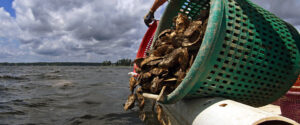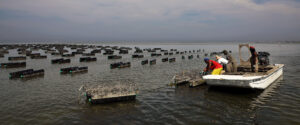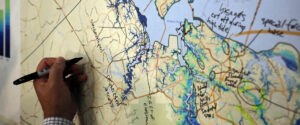Knauss fellow finds the ‘common threads’ in restoration projects
Lush wetlands, healthy rivers, and recovering coral reefs give fish a healthy environment to grow and reproduce. But for every acre of wetland restored or dam removed through the National Oceanic and Atmospheric Administration’s Restoration Center, there are benefits beyond the fish. These 2,180 projects have brought together thousands of volunteers and built partnerships between non-profits, state agencies, tribal organizations, and local governments.
Measuring the success of restored habitat—cleaner water, recovery of endangered fishes, creation of new jobs—is part of many restoration projects. Showing the value of the partnerships forged and technical assistance offered behind-the-scenes is not as straightforward. As a Knauss Fellow and habitat science and policy analyst for NOAA’s Restoration Center, Zuzanna Abdala helped the host office find ways to showcase their technical assistance for restoration work.
“Technical assistance is the stuff we do in addition to our core responsibilities…like building relationships, talking to and enhancing partnerships with tribes, and streamlining federal processes,” Abdala said. “This is not required to do a restoration project, but it helps restoration projects happen in a better way.”
To understand the different types of technical assistance, Abdala met with Restoration Center employees working in the different regions through the country. She learned about the many projects underway, from oil spill response to coral reef farming.
“There’s oceanic restoration, and then also land and wetland restoration that happens,” Abdala said. “I’ve gotten to understand the high-level version of these projects.”
Whether it’s dam removal for spawning salmon in the Northwest or oyster restoration, each project builds different partnerships and requires unique forms of technical assistance. Abdala was able to find the “common threads” in the technical assistance offered across the Restoration Center’s many projects.
Based on what she learned about many different projects, Abdala created categories for two main types of technical assistance: project-level assistance and regional-level assistance for larger efforts. These definitions will be part of a larger framework to show the full value of the Restoration Center’s technical assistance.
The center has two main programs: a Damage Assessment, Remediation, and Restoration Program that responds to environmental disasters, and a Community-Based Restoration Program that focuses on regional restoration projects.
“I really enjoy learning how to make improvements within an office—problem-solving to make our restoration happen more efficiently—looking at it from the 30,000-foot level, seeing all the moving parts, and understanding how all these things work together,” Abdala said. “Just finding common threads, or different ways of doing things, and talking about if that’s a better way.”
After her fellowship, Abdala will continue working with the Restoration Center, and said she hopes to delve deeper into some of the regional projects that are underway.
Takeaways:
- As a Knauss Fellow and habitat science and policy analyst for NOAA’s Restoration Center, Zuzanna Abdala helped the host office find ways to showcase their technical assistance for restoration work.
- During her fellowship, Abdala learned about the many types of restoration work occurring and identified categories and definitions for the different types of technical assistance offered.
- Her fellowship project will help her host office show the value of the partnerships forged and technical assistance that are part of restoration work.
Video produced by Aileen Devlin | Virginia Sea Grant
Published Jan. 6, 2021.
“I am just really enjoying learning how to make improvements within an office—Problem-solving to make our restoration happen more efficiently, and looking at it from the 30,000-foot level,” Abdala said.





